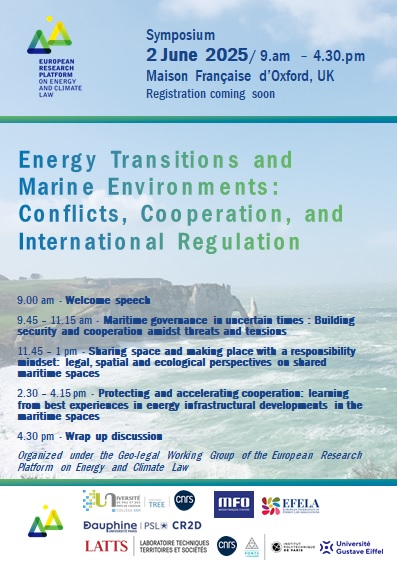Energy Transitions and Marine Environments : conflicts, cooperation and international regulationMaison Française d’Oxford, Royaume-Uni
Le 2 juin 2025 de 09h00 à 16h30

As the UN Nice Conference on the Oceans takes center stage in 2025, it is an opportune moment to reflect on the role of maritime spaces in the energy transition, which has increasingly attracted the attention of policymakers, legal professionals and social scientists. The Geo-legal Working Groupe of the European Research Platform on Energy and Climate law has identified this timely issue as the focus of its work in 2025.
The symposium will gather contributions from law, social and environmental sciences to address governance challenges related to energy development in marine environments, focusing on the North of Europe (North Sea, Irish Sea, Baltic Sea). These areas are strategic for oil and gas production in Norwegian waters and UK waters and are rapidly becoming key sites for offshore wind under the North Seas Energy Cooperation 'NSEC). The aim is to explore how legal frameworks can adapt to the specific challenges of these spaces.
Main challenges:
The discussions will examine zoning systems, space-sharing practices, and marine spatial planning – including marine protected areas - as tools requiring reorganization of legal and spatial frameworks. These developments raise tensions between national and international law, particularly in cross-border infrastructure. The symposium will map existing frameworks and explore how to better integrate them across scales to support sustainability and mitigate tensions.
The symposium will also focus on new bilateral cooperations in cross-border investments, questioning the roles of actors, power imbalances and risk sharing. Key themes will include energy justice, governance of common poll resources, and the rights of future generations. It will also interrogate legal definitions of ownership and appropriation and whether maritime spaces can be treated as common goods in support of sustainability goals.
The presentation of these topics will consider whether these challenges reflect a shift in maritime governance or reproduce existing tensions, raising the question of new "blue legalities" (Braverman & Johnson, 2020). Finally, the symposium will highlight the need for methodologies that capture adaptive interdisciplinary approaches to the energy transition.
This symposium is organized under the Geo-legal Working group of the European Research Platform on Energy and Climate Law

